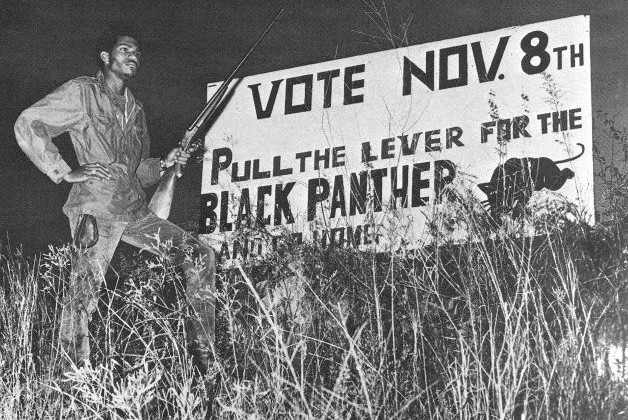Voter suppression – class war against workers
A July 1 ruling by the U.S. Supreme Court issued a death blow to the 1965 Voting Rights Act, which protected historically disenfranchised voters of color.

Election night, Lowndes County, Ala., Nov. 8, 1966.
In a 6-3 ruling in Brnovich v. Democratic National Committee, the right-wing majority court nullified Section 2 of the Act, which barred voting procedures that “result in a denial or abridgment of the right of any citizen of the United States to vote on account of race or color.” The section was the last effective portion of the Act, already seriously damaged by the Court’s 2013 ruling in Shelby County v. Holder.
The Brennan Law Center announced that 28 state legislatures have already enacted laws in 2021 to limit access to voting, and 61 bills with restrictive provisions are moving through 18 state legislatures still in session. Hundreds more could be proposed, limiting access to millions of voters. (tinyurl.com/3xajyy88)
The Republican rush to voter suppression accelerated during the 2020 election that white-supremacist President Donald Trump lost. Although Republicans deny they are attacking voting rights, during the SCOTUS hearings Arizona’s attorney argued such rights should be struck down — to prevent Democrats from winning. (tinyurl.com/4awad4wc)
But denying people the right to vote is “the American way” — as old as the country and a strategy of every U.S. bourgeois political party. Voter suppression has targeted the most oppressed peoples — those of color, Indigenous, poor, female, immigrant and incarcerated.
Voter denial has always been a class-war tactic designed to keep state power in the hands of the owning class — which defined voters from the beginning as free, white, adult male landowners in the 1787 U.S. Constitution.
Not only were enslaved African peoples denied the right to vote from their first kidnapping to these shores in 1619, they were disgracefully and cynically used as pawns in ruling-class power struggles when enslavers were allowed by the Constitution to count people they owned as “three-fifths of a free individual” for purposes of congressional representation for whites.
Indigenous peoples did not become legal “citizens” of the U.S. until 1924, and because the states determined voting rights, some were not allowed to vote until 1957. To dominate, an owning class requires control of the land — so genocide, land seizures and denial of basic rights were leveled on Indigenous peoples who have inhabited the continent for eons before European settlers “discovered” the misnamed “New World.”
Unchecked owning-class exploitation of workers has fueled suppression of both voting rights and citizenship in the U.S. In 1882 U.S.-born people of Chinese descent — a growing force of immigrant workers in the Western states — had their citizenship and right to vote taken away from them in the Chinese Exclusion Act. And Japanese Americans incarcerated in internment camps during World War II had their right to vote challenged by the Native Sons of the Golden West, white supremacists who campaigned to strip all “nonwhites” of citizenship.
Incarcerated people in U.S. jails, prisons and ICE internment — disproportionately Black, Latinx, migrant and Indigenous people, with a majority poor white people — are still bound by the Constitution’s 13th Amendment clause legalizing “involuntary servitude” in prison. That serves as justification for their losing the right to vote, either on a temporary or permanent basis, if convicted of a felony.
Black struggle won voting rights
African American men and women did not even get the right to vote until the 15th Amendment in 1870 and the 19th Amendment in 1920, respectively. These changes to the Constitution came only after a bloody Civil War and centuries of struggle.
But the Southern states of the old Confederacy still prevented Black people from voting — through massacres, beatings, lynchings, rape, and legislative ploys like bigoted qualification examinations and the anti-poor poll tax.
Only the epic battles of the Black Civil Rights Movement — the martyrdom and sacrifice of countless African American people — expanded the right to vote for all disenfranchised people in the U.S. That movement stretched from Black Reconstruction into the 1960s and won the 24th Amendment to the Constitution in 1964, repealing the poll tax, as well as the groundbreaking 1965 Voting Rights Act.
The struggle continues in this century. Witness the on-the-ground organizing led by Black women in Georgia that defeated white supremacists in the 2020 elections. Witness the Black Lives Matter demonstrations of millions against the police murder of George Floyd, asserting the right to live in the face of murderous racism — a mass movement still challenging state power at its base.
The right to vote is a basic bourgeois democratic right. As communists, we are in deep solidarity with all oppressed peoples fighting racism, poverty and bigotry — and we support their right to wield their vote in these struggles.
As communists, we fight for justice wherever the battle rages. We know that militant organizing for basic rights now can be a path to demands and visions for real freedom in the future.
And most of all, we know that to build anti-racist solidarity with and among oppressed and working-class people is to build the foundation for socialism.

